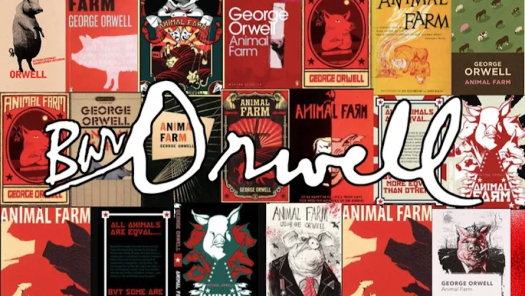"We still like to pretend in some way that we're making art" — Natalia Yanchak says this matter-of-factly from a rest stop somewhere between Toronto and Montreal. Her husband and bandmate, Murray Lightburn, is ordering her coffee and a veggie sandwich, and occupying their two children while Yanchak handles press for the Dears' newest full-length, Times Infinity Volume One.
It's been 20 years since the Montreal-based alt-pop band first assembled, and 17 or 18 years since Yanchak took her place behind the keys and mic. The Dears' first record, 2000's End of a Hollywood Bedtime Story, helped signal a seismic shift in Canadian music: the rise of the indies. They also helped usher in a new era in Montreal's music scene, because before Metric, Stars, and Arcade Fire, there were the Dears.
"One thing we do have is an identity," Yanchak tells Exclaim! "That's something that a lot of new bands struggle with, the 'who am I?' factor. We very defiantly assert ourselves, much to the dismay of some and the joy of others."
Times Infinity Volume One has all the hallmarks one expects from the Dears: achingly real wit and darkly tender observations; the warm hug of Lightburn's lead vocals versus the crisp clarity of Yanchak's; the twisty narrative surprises in the lyrics as layered guitars, drums, synths and strings stretch over melodies and choruses. The song titles pivot between cleverly noir and heartfelt, from "You Can't Get Born Again" and "Hell Hath Frozen in Your Eyes" to "Onward and Downward" and "We Lost Everything."
"I think there's an aspect of our music that is a brutal mirror for people sometimes who don't want to see or are not ready to see," Yanchak says. "This album definitely deals with concepts of relationships, romantic and not romantic, just relationships on a human level. That can spread its arms into being love and those kinds of feelings."
The Dears' last studio record was 2011's Degeneration Street, and when it came time to write and record, they found that they had way more material than they knew what to do with.
"We finished the songs to a point and then just started recording everything," Yanchak says.
Eventually they had to decide: long album, double album, separate album or some other option?
"I don't think that people have the bandwidth to consume a really long album anymore, so we just decided to make two albums. That became a difficult process because we didn't want to have one album be a bunch of B-sides or something lesser, you know? We had to very democratically spread the 'good' songs across two albums. You deliver a product — I mean, it's gross to talk about music in this way, but at the end of the day it is a music business and somebody is going to try and sell your music. We need to have singles and that is something we have to think about."
But, Yanchak says, the band don't worry about singles until the end of the process. "We don't sit down and think, 'now we're going to write a single.' Those songs reveal themselves to us as they approach completion in the studio. Some songs are just stronger than others. A single has to have a certain emotional narrative and yet be very accessible and has to be a certain tempo. It can't be a 12-minute song and it can't be the one with no chorus. In our world that would be a single, but not in anybody else's."
"Here's to the Death of All the Romance" was actually the perfect choice for Volume One's first single; it captures the essence of the record. It's deeply moving and full of urgency, keys racing against a flurry of fuzzy guitar, like a dark heart burst open by a bright light, but it's also spiky and strange.
"There's something very fatalistic about the themes of that song but it's very fun," Yanchak says. "We've been sort of thinking about this as a band and we think that Volume Two is darker than Volume One. That's the consensus: [Volume Two] is a darker album and this is the positive one."
So this is the Dears' idea of a joyful record?
"Like that having-to-go-to-church joy," Yanchak says with a laugh.
Times Infinity Volume One is out now on Pheromone/Dangerbird.
It's been 20 years since the Montreal-based alt-pop band first assembled, and 17 or 18 years since Yanchak took her place behind the keys and mic. The Dears' first record, 2000's End of a Hollywood Bedtime Story, helped signal a seismic shift in Canadian music: the rise of the indies. They also helped usher in a new era in Montreal's music scene, because before Metric, Stars, and Arcade Fire, there were the Dears.
"One thing we do have is an identity," Yanchak tells Exclaim! "That's something that a lot of new bands struggle with, the 'who am I?' factor. We very defiantly assert ourselves, much to the dismay of some and the joy of others."
Times Infinity Volume One has all the hallmarks one expects from the Dears: achingly real wit and darkly tender observations; the warm hug of Lightburn's lead vocals versus the crisp clarity of Yanchak's; the twisty narrative surprises in the lyrics as layered guitars, drums, synths and strings stretch over melodies and choruses. The song titles pivot between cleverly noir and heartfelt, from "You Can't Get Born Again" and "Hell Hath Frozen in Your Eyes" to "Onward and Downward" and "We Lost Everything."
"I think there's an aspect of our music that is a brutal mirror for people sometimes who don't want to see or are not ready to see," Yanchak says. "This album definitely deals with concepts of relationships, romantic and not romantic, just relationships on a human level. That can spread its arms into being love and those kinds of feelings."
The Dears' last studio record was 2011's Degeneration Street, and when it came time to write and record, they found that they had way more material than they knew what to do with.
"We finished the songs to a point and then just started recording everything," Yanchak says.
Eventually they had to decide: long album, double album, separate album or some other option?
"I don't think that people have the bandwidth to consume a really long album anymore, so we just decided to make two albums. That became a difficult process because we didn't want to have one album be a bunch of B-sides or something lesser, you know? We had to very democratically spread the 'good' songs across two albums. You deliver a product — I mean, it's gross to talk about music in this way, but at the end of the day it is a music business and somebody is going to try and sell your music. We need to have singles and that is something we have to think about."
But, Yanchak says, the band don't worry about singles until the end of the process. "We don't sit down and think, 'now we're going to write a single.' Those songs reveal themselves to us as they approach completion in the studio. Some songs are just stronger than others. A single has to have a certain emotional narrative and yet be very accessible and has to be a certain tempo. It can't be a 12-minute song and it can't be the one with no chorus. In our world that would be a single, but not in anybody else's."
"Here's to the Death of All the Romance" was actually the perfect choice for Volume One's first single; it captures the essence of the record. It's deeply moving and full of urgency, keys racing against a flurry of fuzzy guitar, like a dark heart burst open by a bright light, but it's also spiky and strange.
"There's something very fatalistic about the themes of that song but it's very fun," Yanchak says. "We've been sort of thinking about this as a band and we think that Volume Two is darker than Volume One. That's the consensus: [Volume Two] is a darker album and this is the positive one."
So this is the Dears' idea of a joyful record?
"Like that having-to-go-to-church joy," Yanchak says with a laugh.
Times Infinity Volume One is out now on Pheromone/Dangerbird.




